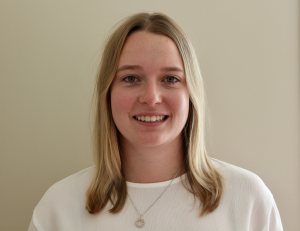New Fellowship Gives LL.M. Grads Real-World Experience in Public Interest Law
December 28, 2020
Mia Penning (LL.M. ‘19) had long dreamed of a career in international human rights, but she was unsure how to pivot from her corporate law job to a position in public interest law.
A new fellowship program for recent graduates of Georgetown Law’s LL.M. program helped her make the transition. After earning her degree last spring, Penning was awarded one of the program’s first 10 fellowships – and spent 12 weeks working at the International Finance Corporation, a sister organization of the World Bank that helps the private sector create new opportunities in developing countries.

Mia Penning
The fellowship was the “perfect way” to gain practical experience at an international organization and pursue her interest in anti-corruption in development projects, Penning said. The best part: Her responsibilities went far beyond those of a typical intern.
Thanks to her unique background and experience, Penning was able to contribute to a project involving her native South Africa. She researched South African companies’ reputations and assessed the organization’s risk of investing in them.
A lot of interns are only allowed to do administrative work, Penning said, but the IFC staff “really engaged with me. They actually look at your resume to see what your background is and what you can help them with. It’s a great opportunity for LL.M.s.”
IFC benefited from the fellowship as well. Penning fit well into the organization and made valuable contributions during her time there, said Aika Aitbaeva (LL.M. ‘10), an IFC risk officer who supervised Penning during her fellowship. “Her knowledge of the local market was very useful. She helped extensively with research and also with her personal insight into how things work locally. She made a great contribution.”
Stipends Support Fellows
Run by the Law Center’s Office of Graduate Careers, the LL.M. Post-Graduate Public Interest Fellowship Program aims to help recent graduates find full-time, permanent employment in public interest law by providing them with opportunities to get real-world experience in the field and expand their professional networks. It’s especially helpful for the LL.M. program’s many international students, who are authorized to work in the United States for up to a year after graduation but sometimes have trouble finding employment for that limited period.
The program offers two types of fellowships: one supports graduates who intern at international organizations in Washington, like IFC, if opportunities are available, and another gives stipends to those who find their own placements at nonprofit and government organizations in any location, including in their home countries.
“It is our hope that our graduates will take what they learned at Georgetown and use it in their lives and careers to work toward a more just world,” said William Treanor, dean of Georgetown Law. “I am proud of the Fellows for pursuing crucial public interest work to do just that.”
This year, fellows have secured positions at organizations ranging from the U.S. Department of Health and Human Services and the Environmental Defense Fund in Washington, D.C., to the Africa office of the Center for Reproductive Rights and a legal defense group for artists in Paris, as well as IFC.
The program’s stipends – which range from $3,000 to $6,500 depending on the length and type of the fellowship – are critical to the program’s mission.

Isabelle Smith
Isabelle Smith (LL.M. ‘19) said the financial support enabled her to gain valuable work experience at the World Bank last summer. “Because my internship was unpaid, I would not have been able to financially support myself throughout the summer, particularly given the high living costs in D.C.,” she said.
Meaza Gelaw (LL.M. ‘19), who last year worked at AEquitas, a nonprofit organization that focuses on gender-based violence and human trafficking, said the fellowship helped her cover costs and grow professionally and personally. It’s been “everything for me,” she said.
Organizations also benefit from working with paid fellows, Aitbaeva said. There is often limited budget to take on skilled, full-time staff for short periods of time, and it’s not always practical to hire part-time interns who work in exchange for credit while still in school. Full-time fellowships, on the other hand, are a “win-win” for both recent graduates and participating organizations: They allow graduates to do important work and make a contribution at notable organizations and to receive pay from the fellowship program for doing so.
Thanks to new funding, the program nearly doubled in size this year, growing to 19 fellowships in this year – three at IFC and 16 at other organizations. Associate Dean for Careers Eloise Pasachoff said she is “delighted” to offer the program again and see it grow.
“We view it as part of our mission to help recent graduates gain practical experience in public interest law and expand their professional networks in the field,” she said.